Sep 20, 2011
IPCC scare: CO2 tipping point is 2030 vs CO2 increase would be a boon to humanity
Reuters reports,
“New research, to be published in the journal Climatic Change in November, suggests humankind may have to remove carbon dioxide (CO2) from the atmosphere on a vast scale if emissions keep rising after 2020. The series of articles provide scenarios which will form the basis of the next report by the U.N.’s Intergovernmental Panel on Climate Change (IPCC) in 2013 and 2014. At present emissions levels, in less than 20 years the sky would effectively be full, meaning every extra tonne of carbon dioxide (CO2) emitted would have to be removed to stay within safer climate limits, one lead author says.”

So the giant sucking sound we hear in 2030 won’t be NAFTA. It’ll be the CO2 extraction industry.
See Lubos Motl attack the IPCC propaganda here.
“At present emissions levels, in less than 20 years the sky would effectively be full, meaning every extra tonne of carbon dioxide (CO2) emitted would have to be removed to stay within safer climate limits.”
No typo. The classical alarmists were saying that the sky was warming. Then it was changing. Disrupting. Weirding. The Chicken Little has been saying that the sky was falling. All those verbs have been rendered obsolete. According to the IPCC 5th report, the sky is getting full and it will be effectively full by the year 2030.
------------------
Prominent Scientist Tells Congress: Earth in ‘CO2 Famine’
‘The increase of CO2 is not a cause for alarm and will be good for mankind’
‘Children should not be force-fed propaganda, masquerading as science’
Washington, DC - Award-winning Princeton University Physicist Dr. Will Happer declared man-made global warming fears “mistaken” and noted that the Earth was currently in a “CO2 famine now.” Happer, who has published over 200 peer-reviewed scientific papers, made his remarks during today’s Environment and Public Works Full Committee Hearing entitled “Update on the Latest Global Warming Science.”
“Many people don’t realize that over geological time, we’re really in a CO2 famine now. Almost never has CO2 levels been as low as it has been in the Holocene (geologic epoch) - 280 (parts per million - ppm) - that’s unheard of. Most of the time [CO2 levels] have been at least 1000 (ppm) and it’s been quite a bit higher than that,” Happer told the Senate Committee. To read Happer’s complete opening statement click here: [Also: See Inhofe Warns of Costs of Massive $6.7 Trillion ‘Climate Bailout’ & ‘Consensus’ in Collapse: Japanese scientists make ‘dramatic break’ with UN hypothesis of man-made warming! (UK Register) & $ave the Planet? ‘Four climate lobbyists for every member of Congress’ - Number of Lobbyists Up 300% & The Year of the Man-made Global Warming Skeptic ]
“Earth was just fine in those times,” Happer added. :The oceans were fine, plants grew, animals grew fine. So it’s baffling to me that we’re so frightened of getting nowhere close to where we started,” Happer explained. Happer also noted that “the number of [skeptical scientists] with the courage to speak out is growing” and he warned “children should not be force-fed propaganda, masquerading as science.”
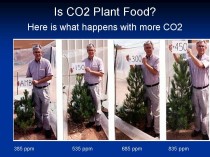
------------------
Corn versus Drought
World Climate Report
In the same volume of Agricultural and Forest Meteorology, a second article appears with fabulous news for corn growers the world over. The article was written by five scientists with the US Department of Agriculture and the University of Maryland. The Chun et al. team notes early in the piece that “There have been many studies on the interaction of CO2 and water on plant growth. Under elevated CO2, less water is used to produce each unit of dry matter by reducing stomatal conductance.” Under elevated CO2 conditions, plants will simply use and need much less water to achieve the same outcome - yet another benefit of increased CO2 concentrations.
But what about corn? To find out, Chun et al. grew corn in chambers with CO2 concentrations at either 400 ppm or 800 ppm, and they varied the amount of water the plants would receive. At the end of the experiment, they concluded “Approximately 13–20% and 35% less water was used under the elevated CO2 conditions than under the ambient CO2 conditions, for the water stressed conditions and for the well-watered conditions, respectively. These results suggest that under increased CO2 concentrations as generally predicted in the future, less water will be required for corn plants than at present.” Their final two sentences are priceless as they tell us that the higher water use efficiency in the elevated CO2 chambers “indicates that less water was used under the elevated CO2 condition to produce similar biomass as that in the ambient CO2 treatment. This study suggests that less water will be required under high-CO2 environment in the future than at present.”

We realize that our future will see droughts in the corn belt - whether these future droughts are related to human activities can be debated forever. The good news is that elevated CO2 will give corn in the future a defense against any droughts that occur - corn will simply require much less water given the biological benefits associated with extra levels of CO2. The goodness will be felt the world over, not just in America’s corn belt.
References:
Chun, J.A., Q. Wang, D. Timlin, D. Fleisher, and V.R. Reddy. 2011. Effect of elevated carbon dioxide and water stress on gas exchange and water use efficiency in corn. Agricultural and Forest Meteorology, 151, 378-384.
Sep 20, 2011
Victory is sweet, but the war continues
By Paul Driessen
Celebrate EPA’s withdrawal of job-killing ozone standards – but prepare for more onslaughts
Millions of Americans recently celebrated the demise of the Environmental Protection Agency’s job-killing ground-level ozone regulations. While a toast was appropriate, we shouldn’t drink too much champagne just yet.
As with the Battle of Midway and Lt. Col. James Doolittle’s Tokyo Raid in early 1942, White House action on this single EPA rule is merely a welcome victory in a long struggle. The U.S. Chamber of Commerce may have declared, “Now, at least they’re listening,” but other observers say the EPA and Obama administration are still tone deaf.”
Indeed, a major factor in the White House decision on ozone was a map showing that 85% of America’s counties would be out of compliance with the Clean Air Act if the new rules were implemented. That would mean no new construction or manufacturing projects could begin - and no jobs “created or saved” - until billions are spent to bring existing facilities into compliance with arbitrary new ozone standards.
Many of those counties are in politically important states like Florida, Ohio, Pennsylvania and Virginia - which better explains the administration’s sudden “conversion,” than does any supposed recognition that its rules are unnecessary and harmful. Moreover, the ozone rule was not killed; it was postponed until after the 2012 elections, to safeguard jobs: White House, administration, Democrat and SEIU jobs.
The administration’s mile-long regulatory freight train merely paused to shunt the ozone boxcar onto a siding, to be retrieved later. The engines and remaining cars are still roaring down the tracks, heading for a collision with a sick economy that has left 14 million Americans jobless, 9 million forced to take part-time work, 2.5 million who have given up looking for jobs, and 46 million on food stamps.
Orchestrated environmentalist outrage over the delayed ozone rule may deflect attention from the rest of the freight train, and make it easier to impose hundreds of other regulations. In fact, reams of complex Dodd-Frank financial rules and Obamacare health sector regulations are still onboard, as are National Labor Relations Board unionizing schemes, Agriculture and Interior Department land use regulations, and many others.
The Energy Department continues to lavish taxpayer dollars on expensive wind and solar projects that provide minimal energy at exorbitant cost, even after two more solar companies went bankrupt, costing Americans another $1 billion and 1,900 jobs. Solyndra alone cost US taxpayers $535 million, to create 1,100 temporary jobs at $485,000 apiece. They’re all gone now.
Citing Energy Department reports, the Washington Post reports that the $39-billion loan guarantee program, which President Obama promised would “create or save” 65,000 jobs, has instead spawned a measly 3,545 new, supposedly permanent jobs - after blowing nearly $18 billion, or $5 million per job.
Green jobs? Greenback jobs is more like it - taxpayer greenbacks for Obama and cronies. Worse, by draining billions from taxpayers, consumers and productive sectors of the American economy, the administration is killing two to three traditional, sustainable jobs for each greenback job it creates.
Then there is EPA, which even in this toxic environment remains the biggest single job-killing agency in government. Its ozone rulemaking is just one of dozens it has planned, finalized, or brought to the brink of sign-off and implementation.
Unable to get cap-tax-and-trade passed in Congress, EPA has its economy-killing carbon dioxide rules waiting on a railway siding, until the November elections spur a regulatory frenzy. It is still preparing coal-fired power plant emission rules to control the 0.5% of mercury that actually enters America’s atmosphere from those facilities, as well as expensive regulations on heavy-duty trucks.
“Cross-state” air pollution regulations will force utilities in a few states to install billion-dollar retrofits on coal-fired power plants that EPA computer models say could (minimally) affect air quality hundreds of miles away. EPA claims 20 states affect downwind states during the May-September NOx/ozone season, but demands that Florida shoulder 79% of the national responsibility.
It claims seven states affect Houston’s air quality, but wants Florida to provide 94% of the alleged benefits for the Texas city, 800 miles away, across the sultry, largely windless summertime Gulf of Mexico - after Florida utilities already reduced their NOx emissions by two-thirds since 2003. EPA also says Texas must retrofit power plants that might affect Illinois communities 400 miles away.
Even crazier, EPA is using outdated air pollution measurements to justify these rules. In reality, data from recent years show the supposedly impacted cities already meet national ambient air quality standards.
EPA’s “maximum achievable control technologies” (MACT) rules will impact power sources in factories and refineries. Its “reciprocating ignition compression engine” (RICE) rules will curtail the availability of thousands of backup, “peaking” and emergency generators at colleges, hospitals, malls, groceries and other facilities. When storms knock out power, or heat waves strain overloaded grids, the dearth of electricity will cause brownouts, blackouts and widespread chaos, especially in hospitals.
Coal ash and water quality rules will raise costs even further for nearly half of America’s power plants - and electricity users - for minimal environmental gain.
For three years EPA has used global warming claims to oppose the Keystone XL pipeline project, which could create hundreds of thousands of American refinery, construction, manufacturing, financial and other jobs - and stymie Shell’s oil drilling plans in Alaska’s Chukchi Sea.
In every instance, EPA claims “the regulatory benefits far exceed the costs.” However, as independent natural scientist Dr. Willie Soon and other analysts have documented, the health, welfare and environmental risks and benefits have frequently been exaggerated or even fabricated.
Worse, EPA steadfastly refuses to consider the significant adverse effects that its rules will have on human health and welfare. The cumulative weight of these rules will send energy costs skyrocketing and kill millions of additional jobs, Affordable Power Alliance co-chair Niger Innis points out.
Poor and newly jobless families will be even less able to afford gasoline, clothing, healthcare, proper nutrition and other basic needs, Innis notes. Many will suffer increased stress, drug and alcohol abuse, domestic violence and crime rates. Many low income families will be unable to afford proper heating during frigid winter months or air conditioning during summer heat waves. People will die.
Equally outrageous, while it may have shunted its ozone boxcar onto a railway siding, EPA is ramping up its campaign to rally support for its dangerous policies. Under its “Plan EJ 2014” initiative and other programs, the agency is “leading from behind” - funneling millions of taxpayer dollars to minority, low-income and environmentalist groups that will advance EPA’s rulemaking, permitting, compliance, enforcement and other agenda items under guise of “environmental justice” and “civil rights” claims.
The Environmental Protection Agency is setting the stage for a national disaster.
EPA Administrator Lisa Jackson insists she wants “a real conversation about protecting our health and the environment.” By all means, let’s have that conversation. It’s likely, however, that she and her radical allies will not enjoy it one small bit.
________
Paul Driessen is senior policy advisor for the Committee For A Constructive Tomorrow, and author of Eco-Imperialism: Green power - Black death.
Sep 19, 2011
La Nina’s Reprise has important implications globally
Weatherbell Meteorologists Joe Bastardi and Joe D’Aleo
Since the inception of Weatherbell last winter, we warned the ‘super’ La Nina of 2010/11 would have major implications. We focused correctly weeks to months in advance on the potential of strong tornado outbreaks, devastating flooding from late snowmelt and heavy rain in the central states, growing drought and heat in Texas and an impact hurricane season with east coast and Gulf coast landfalls likely.
Weatherbell also predicted that the La Nina would weaken into this summer but return for a second winter. This was based on a cold Pacific Decadal Oscillation which usually means La Ninas last two years or more. NOAA came onboard to this thinking in making the La Nina return official in August.
Weatherbell sees the impact of this return La Nina will be again global in nature and significant. Another harsh winter is expected in China and at least the first half of the winter in North America and Western Europe. More heavy snow will accompany the cold as our outlook will show next week
With widespread cooling, WeatherBell Analytics Meteorologists Joe Bastardi and Joe D’Aleo are predicting the global temperature, which has average near 0.2C above normal this year after being over 0.4C above normal last year, will drop to near -0.15C BELOW by March. This is similar to what we saw in 2008. This will mean the yearly cooling trend, off the warm year of 2010, which is underway now, will continue in 2012, which is liable to be the coolest year since the late 1990s.
Computer modeling is now starting to see this. The JAMSTEC Frontier model captures the cooling for both hemispheres this December to February. Most of that southeast United States warmth would come in late winter.
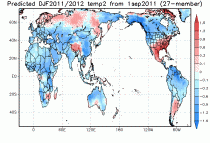
Enlarged
The model shows cooling of the Atlantic to the cold mode, at least temporarily, is likely over the coming 6-9 months following the cooling of the Pacific. The drop is already starting with September. It is likely to be 0.1 to 0.2C cooler than August, which read 0.33C above.
The upcoming ocean cooling can be seen in the same Frontier Model. While there is already the horseshoe of cold water currently surrounding the central Pacific Kuroshio warm plume, which is characteristic of the cold PDO, the model shows the Atlantic will cool and the Atlantic Multidecadal Oscillation will turn negative again as it did in 2008. This will result in a global temperature decline.
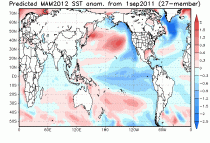
Enlarged
The recent warming in the satellite era can be tied to first the warm PDO and dominance of El Ninos from 1977 to 1998 and then a step warming after 1995 when the Atlantic warm mode ensued. The Pacific has cooled with 7 La Ninas now since 1999 which has flattened the warming. A cooling of the Atlantic would result in a step down global cooling.
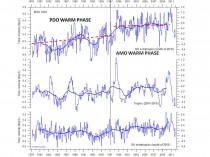
Enlarged
We want to continue to demonstrate to the public that the cyclical events of the global climate and the associated extremes are tied into well established natural causes and importantly PREDICTABLE. As we have with the extreme events of this past year, we trust the forecast of this before the fact, rather than explaining after will make this point once again. The last AMO warm phase lasted about 20 years, so the return to the cold Atlantic and global cooling is likely to occur this decade even if this is another temporary change.
Weatherbell has had a US winter outlook since June 1, which many are now mimicking and the latest NOAA forecast is remarkably similar too. A more detailed outlook will be out September 28, but we are available for worldwide ideas. Also as we have outlooks also for Europe and the far east where major impacts are forecast.
The bottom line is a global temperature drop is coming to the coldest levels in at least several years, and there are winter implications that if you get the jump on, may be of benefit to you
Sep 17, 2011
John O’Sullivan: Fifty IPCC Experts Expose Washington Post Global Warming Lies
Climate Realists

Enlarged.
Mainstream media mouthpiece left shamefaced as fifty international climate experts break ranks to defy global warming cult and denounce junk science.
Washington Post op-ed writer Richard Cohen was last week caught lying while bad mouthing Texas governor, Rick Perry’s presidential candidacy. Cohen, who would have his readers believe humans are dangerously warming the planet, jumped the shark to attack skeptic Perry over his stance on the man-made global warming issue (AGW). Cohen spouted the kooky claim that skeptic scientists “could hold their annual meeting in a phone booth, if there are any left.”
Sadly for Cohen the facts below prove he is just another mendacious mainstream propagandist of climate alarmism.
For instance, the shocking truth is that all 5 official data sets show global cooling since 2002 while a third of all stations sustain a long term cooling trend for their entire history.
Indeed, so infuriated over the blatant lies is Nobel Prize winning physicist, Dr. Ivar Giaever, that last week he resigned in disgust from the American Physics Society for their part in sustaining the now utterly debunked AGW propaganda.
The physics professor who scooped the Nobel Science Prize in 1973 sagely notes, “It is amazing how stable temperature has been over the last 150 years.”
Professor Giaever and the rank and file of scientists are increasingly aware that the ‘consensus’ Cohen and his collaborators alludes to is little more than 77 of 10,000 scientists polled.
Surge in Government Climate Experts Going Skeptic
To further llustrate just how off base Cohen’s spin really is just observe the increasing number of experts who actually worked for the IPCC as contributors / editors / reviewers now turning against global warming junk science. (Hat Tip: The Galileo Movement).
Below, for Cohen and those other mainstream media deniers of climate realism, is a list of just 50 former IPCC experts whose voices your prejudiced ears refuse to hear:
See the 50 responses here.
Sep 15, 2011
Yogi Berra: “It’s deja vu all over again”; Tamino: “No. Your cherry picking… its unprecedented!”
By Steve Goddard
Been There, Done That In The Arctic
Posted on September 18, 2011 by Steven Goddard
Tamino is hopping mad about Joe D’Aleo’s suggestions on WUWT that the Arctic has been this warm in the past, and that ice has melted in the past. The gradual education of Tamino is a worthy - though hopeless cause.
The current Greenland warming, while not yet quite matching the temperatures of 70 years ago
- Walt Meier NSIDC
“Examination of several proxy records (e.g., sediment cores) of sea ice indicate ice-free or near ice-free summer conditions for at least some time during the period of 15,000 to 5,000 years ago”
- Walt Meier NSIDC
CLEVELAND, Feb. 16 (A.A.P.) Dr. William S. Carlson, an Arctic expert, said to-night that the Polar icecaps were melting at an astonishing and unexplained rate and were threatening to swamp seaports by raising the ocean levels.
Leading Arctic expert from 1953
Dr. Ahlman urged the establish- ment of an international agency to study conditions on a global basis. Temperatures had risen 10 degrees since 1900. The navigable season along Western Spitzbergen now lasted eight months instead of three.
Leading Arctic expert from 1947
It was concluded that near Polar temperatures are on an average six degrees higher than those registered by Nansen 40 years ago. Ice measurements were on an average only 6½ feet against from 9¼ to 13 feet.
Russian report from 1940
The Norwegian, Captain Wiktor Arnesen, who has just returned from the Arctic, clains to have discovered an island 12 miles in circumference near the Franz Joseph Island, in latitude 80.40. He says that the island previously was hidden by an iceberg between 70 and 80 feet high, which has melted, showing the exceptional nature of the recent thawing in the Arctic.
See many more stories that demonstrate this has happened before.
---------------
Sea level decline continues
The latest sea level numbers are out, and Envisat shows that the two year long decline is continuing, at a rate of 5mm per year.
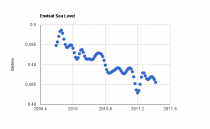
Enlarged
ftp://ftp.aviso.oceanobs.com/
And in the artcic, ice extent from satellite has been increasing now for a week. If the trend up continues (likely unless changing winds moves ice near the edge out to the Atlantic or compresses it), it will have fallen 6.4% short of 2007’s satellite age record.
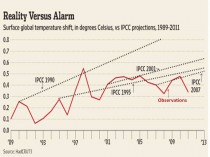
enlarged.
The following shows in green the ice this year that was not there in 2007, the red in 2007 areas with ice that have less than 15% cover on this date (enlarged).
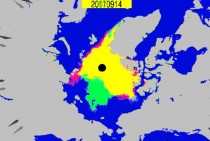
See how natural factors explains the decline and how the ice has varied in a predictable multidecadal cycle over the last century here.
The snow is beginning to show up in Canada and Siberia (enlarged).
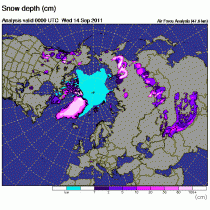
|













